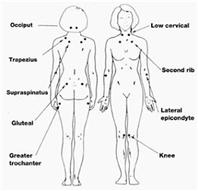I really learnt a lot on my pain management course. I'm going to share with you all information I was given that some of you might find helpful so keep posted on my blog!
Sorry if some of you have seen all this before.
- Lets get started -
WHAT IS FIBROMYALGIA?
A CONDITION CHARACTERISED BY CHRONIC WIDESPREAD PAIN.
A SYNDROME OF UNKNOWN CAUSE.
CLASSIFICATION BY THE AMERICAN COLLEGE OF RHEUMATOLOGY IN 1999 INCLUDES DIFFUSE SOFT TISSUE PAIN OF AT LEAST 3/12 DURATION AND PAIN ON PALPATION OF AT LEAST 11/18 TENDER POINTS.
EXACERBATED BY EXERTION,STRESS,LACK OF SLEEP AND WEATHER CHANGES.
A DIAGNOSIS OF EXCLUSION.
TENDER POINTS (see above image)
WHAT’S IN A NAME?
PREVIOUSLY KNOWN AS FIBROSITIS.
IN MEDICINE WHEN A WORD ENDS IN “ITIS” IT SIGNIFIES INFLAMMATION.
NO EVIDENCE TO INDICATE THAT THE ACHES AND PAINS ASSOCIATED WITH FIBROMYALGIA HAVE MUCH TO DO WITH INFLAMMATION.
MYALGIA IS PAIN IN THE MUSCLES RATHER THAN THE JOINTS.
SYNDROME – A GROUP OF SYMPTOMS WHICH WHEN OCCUR TOGETHER PRODUCE A PATTERN TYPICAL OF A PARTICULAR DISEASE.
AFFECTS
Affects 2-6% of population
More women than men
Often over-looked and misdiagnosed (dont I know it!)
Multiple consultants/clinic appointments
90% describe moderate to severe fatigue
Rare seen in the elderly
OTHER FEATURES
FATIGUE.NON-RESTORATIVE SLEEP.
DISTURBED SLEEP PATTERNS.HEAD-ACHE.
ANXIETY DEPRESSION.
POOR CONCENTRATION.I.B.S. /BLADDER.
C.T.S.
PINS AND NEEDLES HANDS AND FEET.
IRRITABLE / WEEPY.
INABILITY TO PERFORM DAILY LIVING ACTIVITIES.
COGNITIVE BEHAVIOURAL THERAPY
Change emotional and behavioural reactions to pain
Provide skills to control pain in ability to affect the pain experience
To take responsibility for managing the condition
To attribute the success to own effort
Goal setting
Pacing methods
SLEEP
SLEEP IS DIVIDED INTO 90 MIN CYCLES OF NREM AND REM SLEEP.
CYCLES REPEAT 3-6 TIMES PER NIGHT.
STAGE 1 alpha brain wave patterns (light sleep).
STAGES 2 &3 beta and gamma waves (deeper sleep).
STAGE 4 delta waves (deepest sleep). Fibro suffers cannot get to this stage.
THE MOST RESTFUL STAGE OF SLEEP IS THE DELTA STAGE.
80% OF GROWTH HORMONE (REPAIRING HORMONE) IS PRODUCED DURING THE DELTA STAGE.
G.H. HAS A DIRECT EFFECT ON THE REPAIR AND REGENERATION OF MUSCLES. WHEN DELTA SLEEP IS DISTURBED INSUFFICIENT G.H. IS RELEASED AND MAY ACCOUNT FOR THE MUSCULAR SYMPTOMS OF FIBROMYALGIA.
SLEEP DEPRIVATION
DECREASED REACTION TIME.
POOR SHORT-TERM MEMORY.
DECREASED COGNITIVE ABILITY.
MUSCULAR PAIN.
DEPRESSION.
IRRITABILITY.
ACCIDENTS.
WEAKENED IMMUNE SYSTEM.
Don’t eat a big meal before bed-time or go to bed hungry. Try a light snack for example warm milk and foods such as bananas and turkey which contain Tryptophan. Tryptophan is an essential amino acid that the body cannot produce. (Amino acids are chemical compounds which are the "building blocks" of the body).
This amino acid plays an important role in the production of serotonin. Serotonin is essential for sleep and mood regulation and without adequate serotonin the severity of insomnia a person suffers will increase.
Other foods high in Tryptophan include chicken, beef, brown rice, nuts, fish, eggs, cheese, vegetables and lettuce. Using foods that contain more carbohydrates is a better way to increase your Tryptophan absorption and aid in the production of serotonin, which helps to relax the body and combat sleep problems.
Do go to bed at the same time each night. Try not to break this routine especially at week-ends when you may want to stay up later or lie –in.
Establish a “pre-sleep routine” such as a warm bath or try relaxation.
Exercising regularly, particularly in the morning or early afternoon can help sleep. If you exercise too late in the day (especially within the 2 hours before bed time) you may reduce your ability to fall asleep.
Avoid napping during the day. If you must nap, do it in the early afternoon and sleep for no longer than 30 - 40 minutes. If you continue to have difficulty sleeping at night, try to eliminate napping altogether.
Avoid alcohol 4-6 hours before bed time.
Alcohol has an immediate sleep-inducing effect, but it causes a “wake-up” effect a few hours later as the alcohol levels in your blood starts to fall.
Avoid caffeine (such as tea, coffee, chocolate and some soft drinks) for at least 4 - 6 hours before bed-time. Caffeine can cause problems with sleep for 10 -12 hours after drinking it.
Don’t smoke within 6 hours of going to bed. Nicotine is a stimulant and will keep you awake.
